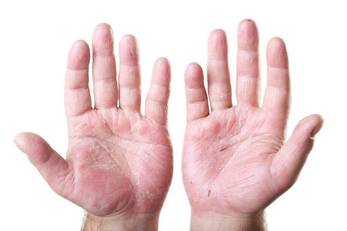Taking too many antibiotics to treat eczema may worsen your condition

BY DR. LESLIE BAUMANN
04/2017
Recently, dermatologists and medical students from across the nation attended the 37th Annual Advances in Dermatology meeting held at New York University. Dr. Seth Orlow, chairman of the Department of Dermatology at New York University School of Medicine, presented on the connection between atopic dermatitis, more commonly known as eczema, and the skin’s complex microbiome.
One key aspect of Orlow’s presentation involved the often misunderstood relationship between eczema and a specific strain of bacteria called Staphylococcus aureus.
Cause or Effect?
Numerous studies have found that people with eczema nearly always have a much higher concentration of S. aureus bacteria living on their skin than those without this common condition. In fact, the more severe the eczema, the greater the amount of S. aureus that seems to be present on the skin.
These findings lead many to believe that this bacteria causes eczema but this can lead to overuse of irritating antibacterial soaps and overuse of antibiotics. Orlow tells Dermatology Times that focusing on S. aureus as the sole cause of atopic dermatitis is problematic, as the more likely scenario is that the underlying inflammation of this skin condition is what leads to an overabundance of S. aureus colonization on the skin.
As a result, treating eczema with aggressive rounds of oral or topical antibiotics to get rid of this bacteria could do more harm than good in the long run because these treatments are not generally effective and contribute to the growing problem of antibiotic resistance all over the country.
Probiotics and Eczema
Fortunately, research on the most effective medications for eczema continue to uncover potentially groundbreaking possibilities for future treatment methods. Current studies are examining the use of probiotics, or “good” bacteria, to help diversify the skin’s microbiome in people with eczema, which helps protect the skin from pathogenic bacteria. (NBC News). The hope is that by normalizing the skin’s microbiome, probiotics will help alleviate eczema symptoms and minimize the incidence of future flare-ups.
Dr. Leslie Baumann is a board-certified dermatologist and CEO of Baumann Cosmetic & Research Institute in Miami.
http://www.miamiherald.com/living/health-fitness/skin-deep/article165597567.html
04/2017
Recently, dermatologists and medical students from across the nation attended the 37th Annual Advances in Dermatology meeting held at New York University. Dr. Seth Orlow, chairman of the Department of Dermatology at New York University School of Medicine, presented on the connection between atopic dermatitis, more commonly known as eczema, and the skin’s complex microbiome.
One key aspect of Orlow’s presentation involved the often misunderstood relationship between eczema and a specific strain of bacteria called Staphylococcus aureus.
Cause or Effect?
Numerous studies have found that people with eczema nearly always have a much higher concentration of S. aureus bacteria living on their skin than those without this common condition. In fact, the more severe the eczema, the greater the amount of S. aureus that seems to be present on the skin.
These findings lead many to believe that this bacteria causes eczema but this can lead to overuse of irritating antibacterial soaps and overuse of antibiotics. Orlow tells Dermatology Times that focusing on S. aureus as the sole cause of atopic dermatitis is problematic, as the more likely scenario is that the underlying inflammation of this skin condition is what leads to an overabundance of S. aureus colonization on the skin.
As a result, treating eczema with aggressive rounds of oral or topical antibiotics to get rid of this bacteria could do more harm than good in the long run because these treatments are not generally effective and contribute to the growing problem of antibiotic resistance all over the country.
Probiotics and Eczema
Fortunately, research on the most effective medications for eczema continue to uncover potentially groundbreaking possibilities for future treatment methods. Current studies are examining the use of probiotics, or “good” bacteria, to help diversify the skin’s microbiome in people with eczema, which helps protect the skin from pathogenic bacteria. (NBC News). The hope is that by normalizing the skin’s microbiome, probiotics will help alleviate eczema symptoms and minimize the incidence of future flare-ups.
Dr. Leslie Baumann is a board-certified dermatologist and CEO of Baumann Cosmetic & Research Institute in Miami.
http://www.miamiherald.com/living/health-fitness/skin-deep/article165597567.html

